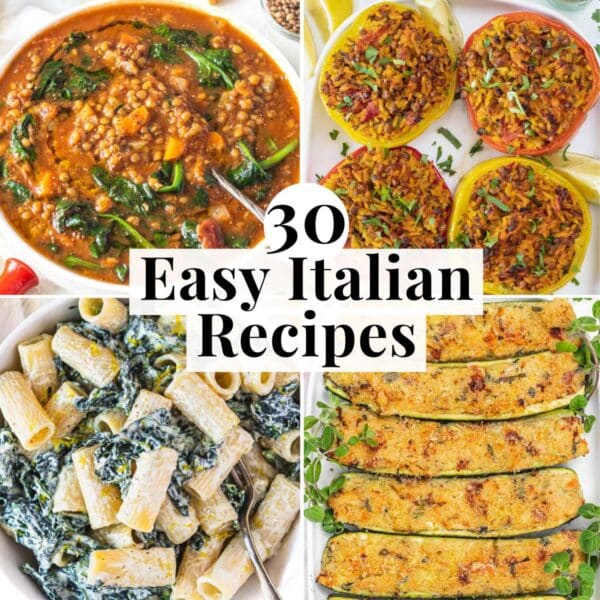Born out of necessity from “cucina povera,” or peasant cuisine, the original Panzanella recipe features day-old crusty bread, ripe tomatoes, crunchy cucumber, and zesty red onions dressed in a simple condiment of extra virgin olive oil and vinegar. The following is the authentic Panzanella recipe you would find traveling in the central Italian regions of Umbria and Tuscany. Panzanella is eaten seasonally in Italy in summer and early autumn when cucumbers and tomatoes are at their best. Its ingredients and flavors will remind you of a tomato-cucumber salad, Greek salad, or Lebanese fattoush salad—except there is no feta here, and the bread is soaked in water, not fried. Panzanella has many versions; some people add carrots and celery, and others add lettuce and vegetables. What unites them all is the use of crusty stale bread softened in water and seasoned with a generous amount of vinegar and extra virgin olive oil. I’ve seen many recipes for Panzanella in which the bread is toasted rather than soaked, and complex dressings are added. You can do that if you like, but we recommend sticking to this simple, authentic recipe. It’s one of the most satisfying textural experiences and the best way to use up stale bread.
Bread
Stale, crusty bread is best for making panzanella. As long as it is not moldy, it can be up to a week old. Sourdough bread is used in the pictures and produces the best result because the crust stays satisfyingly chewy. Excellent alternatives are rustic bread loaves, ciabatta bread, and most artisanal loaves of bread. Avoid baguettes and packaged bread, such as sandwich bread, rolls, and buns. They will become mushy as they soak.
Tomatoes
Tomatoes are the main ingredient in Panzanella, so try to use good-quality tomatoes. They are best if they are in season and from a farmer’s market. The tomatoes should be ripe but firm to the touch. They should be consumed at room temperature to fully appreciate their taste. You can combine more tomato varieties, and locals in Italy use whatever they have at hand without being too fussy. Our favorites are San Marzano tomatoes, Heirloom tomatoes, cherry tomatoes, and Roma tomatoes, but most ripe tomatoes will do.
Cucumber
You can use garden cucumbers, English cucumbers, or Persian cucumbers. You can keep the peel on or peel it off if you prefer.
Red onion
Red onion adds a sharp flavor that complements the Panzanella salad perfectly. Slice it as thinly as possible. If the onion is too strong for you, soak it in cold water for ten minutes before adding it to the rest of the ingredients.
Basil
Fresh basil adds a mellow, sweet, and round aroma. You could substitute other fresh herbs such as parsley, oregano, thyme, and dill for basil, although basil is the most authentic.
Lettuce
Lettuce is optional. Some Italian Panzanella salad recipes include lettuce; others don’t. We made one with lettuce to show you how it looks, and we loved it. We recommend Romaine lettuce.
Olive Oil
Use extra virgin olive oil if possible.
Vinegar
There is no hard rule about vinegar; you can use white wine vinegar, red wine vinegar, apple cider vinegar, or balsamic vinegar. Panzanella relies heavily on vinegar, so you’ll need more than other salads.
Salt and Pepper
Season Panzanella with a good pinch of sea salt and a few twists of freshly ground black pepper.
Ingredients that are not in Panzanella but you can add if you like
Authentic Panzanella salad contains none of the following ingredients: garlic, homemade croutons, dijon mustard, capers, fresh mozzarella, parmesan, or any other type of cheese, red or yellow bell pepper, chicken, or shrimp.
1. Soak the bread
Break the stale bread into big chunks and add them to a bowl. Cover them with water and two tablespoons of vinegar. Soak until the bread becomes soft. Depending on how dry it is and the type of bread, it can take 5 to 15 minutes for the bread to soften. Tip: If you don’t have stale bread, you can dry fresh bread in the oven. Bake it on a baking sheet for 15 to 30 minutes at a low temperature (210˚F or 100˚C), then soak it in water.
2. Cut the veggies
While the bread soaks, prepare the veggies. Cut the cucumber half lengthwise, then into thin slices. Next, cut the red onion in half, peel it, then cut it into thin slices. Finally, cut the tomatoes into wedges. Don’t discard the tomato juice. Cut the lettuce into bite-size pieces. Add vegetables to a large mixing bowl.
3. Add the bread
With your hands, squeeze the water from the soaked bread, break it into bite-sized chunks, and add it to the vegetables. You don’t want neat bread cubes but rather rustic pieces of bread. We want the bread to be on top of the veggies to receive most of the seasoning. Tip: Don’t let the bread soak too long, or it’ll get mushy. Some bread pieces should be harder than others, and the crust should retain some bite.
4. Season with oil and vinegar
Season the ingredients with extra virgin olive oil, vinegar, salt, and black pepper. Most of the seasoning should hit the bread first. Add the basil leaves, toss well, and set aside at room temperature for about 15 minutes before serving. Tip: there’s no need to whisk the condiments into a vinaigrette. That’s not customary in a classic Panzanella salad.
Tomato Bruschetta Farinata Olive tapenade on crostini Homemade hummus
For lunch
Serve a larger portion and make it a main meal for a quick, easy, and healthy lunch by adding olives, chickpeas, or beans.
Bruschetta
Olive Tapenade
Farinata (Socca)
Hummus
You can even add some crumbled feta cheese. Panzanella is excellent for a vegetarian lunch because it’s light, fulfilling, and satisfying.
As a side dish
Try Panzanella next to:
Eggplant Parmigiana Tomato risotto Broccoli pasta Ooni pizza or quick pizza Focaccia Creamy tomato pasta Zucchini fritters Chickpea fritters Lentil patties
For breakfast
Since moving to Italy, Louise has had Panzanella for breakfast almost daily.
Eggplant Parmigiana
Creamy Tomato Pasta
Zucchini Fritters
Lentil patties
Good homemade bread is a staple in our diet, and we always have some staling in our pantry, ready to be mixed with tomatoes, cucumbers, or whatever veggies are hiding in our fridge. She prefers it to oats, pancakes, banana bread, croissants, and any other breakfast recipe, so I thought I should add it here in case you want to try it. Wet slices of stale bread with water and top with chopped tomatoes, basil, vinegar, and olive oil.
Panzanella Toscana
Choose unsalted artisanal white bread, just like Tuscan bread. In Tuscany, the vegetables in the Panzanella are sometimes cut into long, thin slices. In some areas, they add celery. No lettuce is added in Tuscany.
Panzanella Pugliese
In Puglia, they often use Friselle instead of bread. Friselle are large, round pieces of dry, baked durum wheat flour, often with a hole in the center.
Winter Panzanella
We make this variation during the colder months. You can use cherry tomatoes instead of vine tomatoes; add 1 cup (200 grams) of white cannellini beans instead of cucumbers. Refrigerator: We recommend storing Panzanella in the refrigerator for up to 12 hours. Once out of the fridge, leave it at room temperature for at least 30 minutes. Freeze: this recipe is not suitable for freezing.
Shirazi Salad
Chickpea Salad
Black Bean Salad
Mediterranean Salad
Tuscan Bean Stew
Tuscan White Bean Soup
Castagnaccio – Chestnut flour cake
Kale Soup
45 Best Salad Recipes
30 Easy Italian Recipes
45 Easy Vegetarian Dinner Recipes
30 High Protein Vegetarian Meals





































